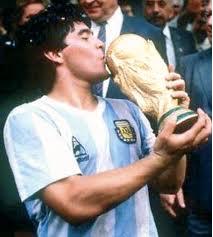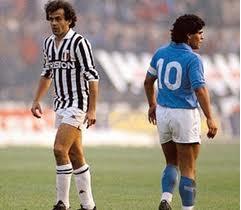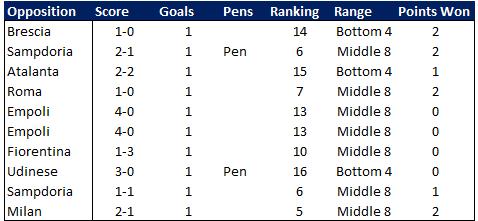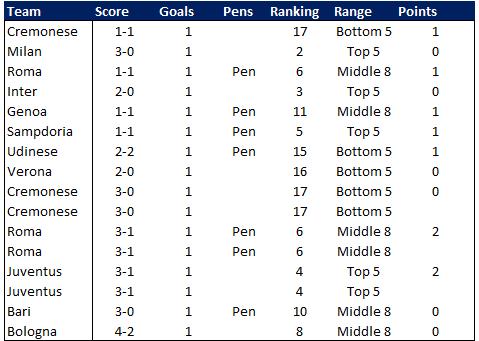From the early 90’s to the current team, Barcelona have relied heavily on the magic of their South American superstars. One club, two nationalities and five of the best players of all time. All won the World Player of the Year Award in their time with the Catalan club. But who performed most in the big games? And who was most important to the team? The fourth feature in the Player Comparison series compares those brilliant Barcelona boys – Romario, Ronaldo, Rivaldo, Ronaldinho and Messi.
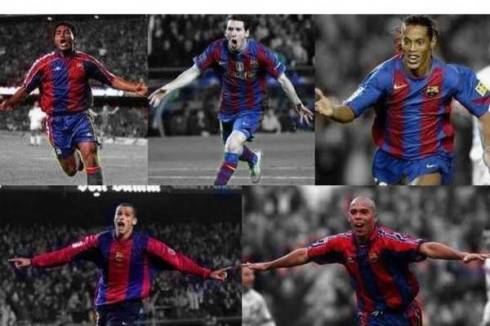
The Contenders:
First up is Romario, the Brazilian marksman was a ruthless finisher, and one of only two players to have scored 1,000 career goals – depending on what you class as official (more on that one here). He played in 6 different countries for 10 different teams, including footballing giants Adelaide United, Miami FC and Al-Sadd. For Brazil, he scored an incredible 55 goals in 70 games, winning the World Cup and the Copa America (twice). Described by Johan Cruyff as a “genius of the goal area”, he won La Liga and the Spanish Super Copa during his time his short stay at Barcelona.
Ronaldo came next. And it was an even shorter stay. For the single season that he represented Barcelona, there were absolutely no doubts who the best player in the World was. Although he didn’t win the League title with the Spanish Club, he did win the Copa del Rey and the UEFA Cup Winners Cup, and despite later going on to play for bitter rivals Madrid, he is still considered one of the Barca greats. Like his predecessor, he also won the Two Copa Americas and a World Cup with Brazil – and is the tournaments all time top scorer with 15 goals. In total he scored 62 goals in 98 appearances for Brazil. He suffered three career threatening injuries, with many suggesting that without them, he could have been the best of all time. Despite this, he still managed to win the World Player of Year award on three occasions.
After Ronaldo’s sale to Inter Milan, Rivaldo was identified as the player to fill the “Brilliant Brazilian” hole that had been left behind. More of a playmaker than the two before him, he was still a prolific scorer, particularly in his 5 years with Barcelona. Deadly from set pieces, he also had the eye for the spectacular – none more so than his hat trick to beat Valencia on the final day of the season to pip them to the last Champions League spot in 2001. The third goal was an over head kick from outside of the area in the last minute (as seen here), and possibly better than Pele’s in escape to Victory. He had a left foot like a magic wand/traction engine, and like Ronaldo, he enjoyed his greatest moment in the 2002 World Cup, as part of the 3 R’s attack. As appears to be the pre requisite, he also won the Copa America, and scored 34 goals in 74 appearances. He’s had even more clubs than Romario, and at 39, is still playing.
Fourth in the list, was cheeky schemer Ronaldinho. As with Rivaldo, he was also more of a playmaker, one blessed with incredible dribbling skills. He is one of the few Barcelona players to have received a standing ovation from fans of Real Madrid in the Bernebeu. Although mainly deployed from wide positions, he has close to 300 career goals (stop laughing Romario) including the 33 for his country (from 93 caps). At 31, he is still strutting his stuff in the Brazilian league with Flamengo. He’s regarded by some as a wasted talent, but during his time with Barcelona he won two World Player of the Year awards. Not bad for an International Playboy (I met him once in Las Vegas – the reputation is justified). Ronaldinho’s partying and the emergence of another skillful playmaker resulted in a somewhat premature exit from the Nou Camp, after he signed for AC Milan (like Rivaldo and Ronaldo before him). As with the players above, he also has World Cup and Copa America medals.
And so on to the last and current Barca player in our list – Lionel Messi. He has the vision of Rivaldo, the dribbling of Ronaldinho, and the finishing and pace of Romario and Ronaldo. He, like Ronaldo has 3 World Player of the Year titles. Where he differs from his Brazilian predecessors (apart from his nationality) is that he’s been a one club man. He had to overcome similar physical challenges as Rivaldo before making it as a top class player. The undoubted best player in the World at the moment, he just has to do it on the International stage to truly cement his place as one of the best, if not the very best of all time. He currently has 222 goals in 309 games for his club (as at the time of writing), and a rather more modest 19 in 66 for Argentina.
 “No hard feelings, I just want your Number 10”
“No hard feelings, I just want your Number 10”
Rules:
As per usual, it’s primarily a comparison of their Leauge goals rather than all goals. Why? Because it’s similar opposition (give or take for relegation) – and these opponents are ranked, meaning that we can calculate an average. As they played for different amounts of time for Barcelona, it’ll be a look at their most prolific season in the league. This is calculated on final league positions, rather than at the time of playing.
Of course these players aren’t just about goals, but I don’t have the assists available for Ronaldo and Romario, so will leave them out for this comparison.
Background:
Romario, then 27, signed in the summer of 1993 after 129 goals in just 5 seasons with PSV Eindhoven. Under the stewardship of Johan Cruyff, he had just one full season with the Spanish Giants, so we’ll be looking at the 1993-94 season.
Like Romario before him, Ronaldo made his European club bow with PSV, though only stayed for 2 seasons – his 54 goals in 57 games were enough to persuade Barca to part with $17m for a teenager. Under Bobby Robson, Ronaldo played just the one season with Barcelona – 1996-97.
Rivaldo joined aged 25, from La Liga rivals Deportivo La Coruna for a fee of $26m. Though he played for Barca for 5 seasons, it’s his most prolific that we’ll look at – 24 league goals in 1998-99. Free from the shackles placed upon him by Louis van Gaal in previous years, he thrived under Ferrer.
Ronaldinho’s most prolific season was actually after his two World Player of the Year awards. 2006-07 saw him bang in a decent 21 in the league in Frank Rijkaard’s penultimate season with the club.
And lastly, Messi’s best haul in La Liga was as a 22 year old. He looks set to have his best season in goal scoring terms this season, but for the purpose of this piece, we’ll use his prolific season under Pep Guardiola (Romario and Ronaldo’s team mate) in 2009-10.
This was initially going to be about the 4 Brazilian’s, but you can’t leave Messi out of this. He fits the South American World Player of the Year criteria, and plays up top, so we’ll leave him in. Even though his name doesn’t begin with R and end with O.

Statistics:
Apologies for the long build up, but we can now move onto the stats. I’ve decided to look at it based on three criteria – goal scoring out right, big game players, and importance to the team.
Goalscoring:
First up is the the goal scoring records of each player – based on goals per game and goals per minute:

Firstly, Ronaldinho’s 21 goals in 32 games would be an incredible season in most players careers, and a rate of 0.66 goals per game is an awesome strike rate. When you add to that the fact that he played wide of a front three, then it’s even more impressive. However, this comparison is against some of the greatest and most prolific forwards of all time. Whilst Ronaldinho is perhaps only second to Messi in the dribbling stakes, he’s last in the goals table. Similarly, Rivaldo was more than just a goal scorer, so 24 league goals is a great season. To put it into perspective, it would have won the golden boot 4 of the seasons from 1997-2004.
And so onto the super strikers. In all honesty, there’s not much in it. Ronaldo and Messi lead the way in terms of goals scored with 34 (Messi in two games less). Romario wasn’t too far behind with 30 league goals from just 33 games. They all have close to a goal a game strike rate with 0.91, 0.92 and 0.97 goals per game for Romario, Ronaldo and Messi respectively. To add some perspective, in the last 20 years only 3 other players have broken the 30 goal mark in a season – Cristiano Ronaldo last season, Diego Forlan the year before that, and Pizzi for Tenerife back in 1996. Pizzi did so in a 42 game season (he played 41 games), and whilst Ronaldo also did so in a 42 game season, he only played 37 games – within the confines of a normal season now. It’s interesting to see that the 30 goal mark has been broken in the last 3 (soon to be 4) seasons. Is La Liga getting easier?
When looking at the goals per minute, it’s Messi once again that does this business with a goal every 83.53 minutes. That works out better than a goal a game, and when allowing for injury time at the end of both halves of football – Ronaldo and Romario pretty much equal that with goals every 94 and 91.9 minutes. In terms of games scored in, Ronaldo walks this one, with a massive 23. It’s up to you the reader to decide if it’s better to score in more games, or to score multiple times in fewer games. Ronaldo can certainly say his goals influenced more games than the other players.
Winner: It’s a joint win for Ronaldo and Messi on this one. Messi equalled Ronaldo’s 34 in less games/minutes, but Ronaldo did it in more games. It’s also easy to argue that Messi’s team mates were better than Ronaldo’s. Honourable mention to Romario.
Big Game Players:
And so on to round 2, and the lifeblood of this site – who was most effective in the big games? Once again, unfortunately I don’t have the assists available for each player – so whilst they may have dominated the game without scoring (see Messi vs Real Madrid in 2010/11), we’re solely looking at goals.

Well well well. I didn’t just put it together like this so that Ronaldinho and Rivaldo could prevent it from turning into a 2 horse race. It’s certainly interesting that the two Playmakers have the best average ranked opposition per goal. Even though they scored the least amount of goals, they had the mentality to perform in the big games – more so than the small games. They’re the only two on the list that have more goals against the Top 6 than the Bottom 6. It was certainly levelled at Ronaldinho that he didn’t always turn up for the small games (mentally not physically) – and this goes some way to proving it.
Big game? That’ll be Real Madrid. Interestingly, all 5 players scored against arch rivals Real Madrid in their Barca careers, though Ronaldinho didn’t manage it in his most prolific season (a young Messi did though). Romario banged in a hat trick in a 5-0 whitewash, Ronaldo scored the winner in a 1-0 win whilst chasing the Madrid club for the title, Rivaldo scored in a 3-0 win, and Messi scored in a 2-0 win at the Berbebeu.
Although Ronaldinho didn’t have the goal against Madrid, he did score against the teams in 3rd, 4th, 5th, 6th and 7th. And this was a league table where 3rd placed Sevilla were only 5 points off the title, rather than the 24 points that Valencia are behind in today’s table.
Messi has the most goals against Top 6 opposition with 10, but this was in a league where 3rd placed Valencia finished 28 points behind the Champions, and 6th placed Getafe were 41 points off Top spot – whilst only 22 off relegation. The gap between 1st and 6th was only 16 points in Ronaldinho’s 2006-07 season – the lowest by someway – adding to the importance of Top 6 goals.
Ronaldo and Romario fall victim to being consistent with an expected split weighted towards the middle range, and it’s worth noting that Ronaldo’s goals against the Top 6 opposition were worth more points (6) than any of the others.
Winner:Although his star had started to fade, it was Ronaldinho’s big game mentality that shone through. He scored twice the amount of goals against Top 6 as he did against Bottom 6, had the best Average ranked opposition for each goal, and the league he played in was still very very competitive. The only he didn’t notch against Real, he did against all the other challengers.
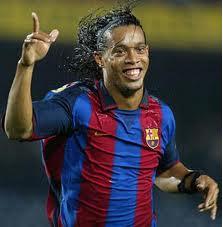
Importance to team – goals as points:
The last measure is based on the importance of the goals. It’s not an exact science but it does give a basis to measure the importance of a goal. For the mathematics behind it, click on the Rules and Workings page. So if we take Romario’s hat trick against Real Madrid as an example, he’d receive zero points for his treble as the team won 5-0. If you take his goals away, then they’d still win 2-0. Similarly, Rivaldo’s hat trick against Valencia in 2001 was worth all 3 points as they were the only Barca goals in a 3-2 win. Take them out and the team lose 0-2. So with that in mind:

Despite scoring less goals than Romario, Ronaldo and Ronaldinho, it’s Rivaldo who’s goals were most important to his team. His 24 goals were woth a massive 20 points to Barcelona’s final tally of 79. This means that he also leads the way in the percentage of team points he was responsible for, with a mightily impressive 25.32. Barcelona went on to win the title that year and usually you’d expect the Champions points spread quite wide across a team. It’s not unusual to see a struggling team have a stand out player for points, as the team points is that much lower, so to score goals worth a quarter of the final tally is very impressive.
Ronaldo once again is there are there abouts. His 34 league goals were worth 17 points as Bobby Robson’s team just missed out on the title by 2 points to Real Madrid. If he’d played all the games, it’s likely that he would have made the difference. He edges out his predecessor Romario who had a credible 16 points. Surprisingly enough, Messi and Ronaldinho’s goals were only worth 13 points – 13.13% and 16.67% of the the over all points tally.
Although they were less important that the other players, Messi is ahead on the percentage of the team goals scored with 34.69% – narrowly ahead of Ronaldo and Romario.
Winner:This one has to go to Rivaldo. Whilst he scored less goals than than 3 of the other contendors, the goals he did score were worth more to his team. Honourable mention to Ronaldo who won 17 points, and scored a third of his teams goals.

Overall Winner:
With wins for each player (aside from Romario) across the three categories, it’s incredibly hard to call this one. Each reader will have their own opinion as to which parameter is most important. Some may well argue that stats don’t tell the whole story – and i’d agree to an extent, as there is no measurement on assists, on brilliance, beauty, style etc…..Personally, Ronaldo is my favourite footballer of all time, regardless of the stats, but regular readers will no that I don’t like to sit on the fence, nor let my preconceptions shape the outcome.
As a result, I decided to rank the players on each measurement and work out the average position. And so, without further ado, I give you:


Overall Winner:

Well it looks like Messi has done it again. Taking into account every single parameter, he just edges out Ronaldo with a average rank of 2.4 across the 10 measurements, with Ronaldo averaging 2.5. It’s no surprise that the order is the same as the number of goals scored.
Whilst he appears set to be crowned Barcelona’s all time greatest player – and 3 Champions League titles of their 4 would suggest it’s justified, it’s worth noting that Ronaldo’s 34 league goals (and 47 overall) came when he was just 19 years old. Messi’s season at 19 read played 26, scored 14 (17 in 36 overall). So whilst Messi is the winner here, i’d stick my neck out and say that had Ronaldo stayed at Barcelona, and avoided injuries, then he would have won.
Interestingly, if you remove the percentage of team goals statistic, then Messi and Ronaldo are level.
In Conclusion:
All five players were among the best of their generation, and arguably of all time. It’s a shame that Romario and Ronaldo’s stay was so short as they both had their best seasons with the club, and it meant that the comparison was restricted to just one season per player.
Whilst Messi tops the league in this comparison, he still falls short on the international stage. The four Brazilians have World Cup and Copa America glory, and until Messi wins big and performs well on the biggest stage, there will still be some doubting his place on the football pantheon, alongside Pele, Maradona and Zidane. I would also put Ronaldo on that list. He’s the all time top scorer in the World Cup, he’s the three time World Player of the year, and he had to overcome three career threatening injuries resulting in having to change his game. A good piece of trivia is that he is the only player to have scored on both sides of the Clasico and the Milan derbies. Ronaldo aged 17-21 is one of the greatest players of all time, and better than Messi at the same age.
Luckily for Messi, there were no measurements based on partying.

Further Viewing:
Enjoy:
Romario 1993/94
Ronaldo 1996/97 Top 10 (The top 3 are ridiculous)
Ronaldo 1996/97 All Goals
Rivaldo 1998/99
Ronaldinho 2006/07
Messi 2009/10
Apologies for the length of this one, but with five players (and five of the all time best), it’s hard to keep the word count down. Make up your own mind who you think was best for Barca. The stats say Messi, my own personal choice is Ronaldo, but it differs for everyone. I hope you enjoyed the latest Player Comparison, and as always, all suggestions are welcome. Whether you want an in depth anaysis, or are just wondering about the stats of a few players to settle a pub argument.
Cheers,
Liam
Tags: Argentina, Average Opposition Index, Barcelona, Big Game Player, Brazil, Feature, Football Stats, La Liga Stats, Messi, Rivaldo, Romario, Ronaldinho, Ronaldo








